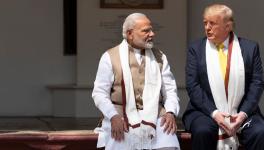Indians Have High Level of Hybrid Immunity Against the Coronavirus: Shahid Jameel

With an increase in the daily number of new COVID-19 cases in India at a snail's pace, the concern over possible deterioration in the near future is also growing slowly. Bad memories of the previous outbreaks that wreaked havoc across the country ought to fuel such concerns.
However, the situation right now differs from what it was earlier.
To talk about the variants circulating in India like the BQ.1.1, XBB or the BF7.4.1, and the possibility of these appearing more virulent
or contagious, NewsClick approached noted virologist Shahid Jameel. Professor Jameel is the former chairman of INSACOG -- which monitors the variants of the coronavirus in the country-- and is currently a fellow at OCIS and Green Templeton College, University of Oxford, UK.
NewsClick (NC): Do you think these new variants have more transmissibility coupled with more virulence and more vaccine-evading
power? Is there any evidence?
Shahid Jameel (SJ): There is no evidence that these new variants have increased virulence, i.e. they can produce more severe disease. What is known is that a key mutation has emerged that allows tighter binding to the ACE2 receptor on cells. This means that it infects better and possibly produces higher amounts of the virus in infected people. That would indirectly increase transmission as well.
NC: The BF.7 variant recently caused a surge in China, which was also found in India. But so far, no significant effect in terms of spread and mortality could be seen in India. What could be the causes of it? Were vaccines in China not so effective to protect its population?
SJ: China has emerged as a special case due to two key factors. First, the vaccines have shown poor effectiveness (not efficacy, which is measured in clinical trials) and antibody levels wane quickly. In 3-4 months post-vaccination, the vaccine effectiveness is reported to be reduced to less than 30%. The second factor is that the zero Covid policy did not allow population immunity to develop as a result of low exposure. So, when the curbs were lifted, the Omicron variants (which are highly infectious) found a very large susceptible population. China has also an increasingly ageing population. With age, immunity develops slower and falls faster. People are also more prone to increased disease severity following the infection.
India had a lot of infections during the Delta wave and then again earlier this year in the Omicron wave. Combined with >90% of adults having received two doses, there ought to be high levels of hybrid immunity. China’s critical mistake was its zero Covid policy and then opening the country suddenly in the winter when people are normally more prone to respiratory infections.
(Hybrid immunity refers to the immunity achieved by prior infections and vaccination. Prior infections give rise to immunity or defence against the disease so do the vaccines.)
NC: Can a variant manifest differential transmissibility and virulence in different geographical locations? If so, what explanations does virology offer?
SJ: It is possible that different variants seed outbreaks in different geographic locations. We call this the bottleneck effect. The same
variant can also manifest differently depending on population immunity and genetics.
NC: India has not put a strict restriction or ban on international travellers, especially those who land in India from different countries. Do you find it all right?
SJ: You have to balance restrictions against what you gain from them. The virus will get through anyway but you land up hurting the economy. The restrictions are to buy time and spread infections over time to not overwhelm the healthcare systems. There was really no gain to restrict people from unaffected countries. But India has put testing restrictions on people from China and several other East Asian countries. This is the correct approach.
Get the latest reports & analysis with people's perspective on Protests, movements & deep analytical videos, discussions of the current affairs in your Telegram app. Subscribe to NewsClick's Telegram channel & get Real-Time updates on stories, as they get published on our website.
























